Kangaroomaze - I Exist To Look At Stuff!

More Posts from Kangaroomaze and Others
🚨 We Need Your Kindness to Survive 🚨
Hello, My name is Mosab Elderawi, and I live in Gaza with my family. Life here has become harder than I ever imagined, and I’m writing this with hope in my heart that you might hear our story.
The ongoing war has devastated my family. We’ve lost 25 family members—each one a beloved part of our lives, taken too soon. I miss them deeply—their laughter, their presence, their love. Every day is a reminder of this unimaginable loss.

64.media.tumblr.com

64.media.tumblr.com

64.media.tumblr.com

64.media.tumblr.com

64.media.tumblr.com
We are now facing daily challenges to survive—things that most people take for granted, like food, clean water, and a safe place to sleep. The harsh realities of life here have replaced our dreams with the constant fight for survival.
Our Current Situation:
💔 Lost Stability: The war has left us without work or a stable source of income. 🍞 Basic Needs: Food and water are becoming harder to afford with rising prices and scarce resources. 📚 Dreams on Hold: Like so many here, my family’s dreams have been replaced by the need to simply survive. 😢 Unimaginable Loss: Losing 25 loved ones has left a void that can never be filled.
How You Can Help:
I’m sharing our story with the hope that someone out there might care. Even $5 can make a big difference for us, and if you’re unable to donate, just reblogging this post can help spread the word.
Your kindness, no matter how small, is something we’ll never forget.
What This Means to Us:
Your support is not about changing our entire situation—it’s about giving us a little relief, a little hope, and a way to keep going. We are not asking for much, and we understand if you can’t donate. Sharing our story is just as valuable to us as a donation.
Thank you for reading this far. It means the world to us to know that someone is listening. Your kindness gives us strength and helps us believe in a better tomorrow.
With all our gratitude, Mosab Elderawi and Family ❤️
✅️ Vetted by ✅️
@gazavetters, my number verified on the list is ( #309 )✅️

@fancysmudges @brokenbackmountain @just-browsing1222-deactivated20 @mothblossoms @aleciosun @fluoresensitive @khizuo @lesbiandardevil @transmutationisms @schoolhater @timogsilangan @appsa @buttercuparry @sayruq @malcriada @palestinegenocide @sar-soor @akajustmerry @annoyingloudmicrowavecultist @feluka @tortiefrancis @flower-tea-fairies @tsaricides @riding-with-the-wild-hunt @visenyasdragon @belleandsaintsebastian @ear-motif @kordeliiius @brutaliakhoa @raelyn-dreams @troythecatfish @theropoda @tamarrud @4ft10tvlandfangirl @queerstudiesnatural @northgazaupdates2 @skatezophrenic @awetistic-things @camgirlpanopticon @baby-girl-aaron-dessner @nabulsi @sygol @junglejim4322 @heritageposts @chososhairbuns @palistani @dlxxv-vetted-donations @illuminated-runas @imjustheretotrytohelp

Gangle AU 🎭✨️



Based on new canon lore that Tails has a curfew and only on new years he’s allowed to stay up because Sonic being inadequate teen parent/bro/fence learned the hard way of a growing fox need for healthy sleep schedule

How Outono was found
The marketplace was as lively as ever, packed with vendors shouting prices and people bustling from stall to stall. Among the crowd was Masha, a young maid making her usual rounds to gather supplies and ingredients for the castle.
And there she was again. Masha (22 years old) had noticed the little girl several times before, darting through the streets, always keeping her distance from strangers. She didn’t beg, didn’t steal—just played with the stray cats and dogs like she was one of them. She was always alone, sitting in the dirt and keeping to herself.

It wasn’t uncommon to see orphans wandering the streets, especially after the war. But this girl stood out. Bright blonde hair, blue eyes, pale skin—she didn’t look like she belonged there. People couldn’t help but notice her, and that made Masha uneasy.
Masha had watched her from a distance, wondering about her story. Where was she from? How old was she? Seven? Eight, maybe? But what really bothered Masha was how much attention the girl could draw just by existing. A chill ran down her spine at the thought of what might happen if the wrong person noticed her.

Masha had heard the whispers in dark alleys. Men who offered food and shelter but delivered nightmares instead—slavery, prostitution, factories. The girl was practically a walking target.
No, Masha thought, she couldn’t just stand by and do nothing. She had to act. It was reckless, impulsive, but she didn’t care. “There you are!” Masha called out, pushing through the crowd toward the girl. Her voice was sharp enough to make heads turn. She grabbed the child’s arm—not hard, but firmly enough to keep her from slipping away.

The girl froze, staring up at Masha with wide, startled eyes. She didn’t fight or run, just stood there, too shocked to react.

“Come on,” Masha said, her voice softer now as she led the girl through the busy streets. She kept her head down, ignoring the curious glances from the crowd. To them, she was just a frustrated aunt dragging a mischievous child home.
As they made their way to the castle, Masha’s thoughts raced. What was she doing? She wasn’t anyone important, just a maid trying to keep her head above water. She had enough on her plate without adding a lost child to her problems. This could blow up in her face. But as she felt the girl’s small, cold hand in hers, she pushed the doubts aside. It was too late to turn back now.
When they arrived, Masha wasted no time. She took the girl’s dirty, torn dress and helped her into a warm bath. The child didn’t resist, but her wary eyes followed Masha’s every move. As the grime melted away, Masha got a better look at her.

Her skin was smooth, untouched by scars or bruises. No signs of the abuse you’d expect from a child on the streets. But she was so thin—her ribs showed, and her small frame seemed almost fragile. Malnourished, but not beyond help.
And her dress… Masha frowned as she picked it up. The fabric was fine, high-quality, definitely not something a street orphan would wear. Someone had cared for this child once. So why was she out here alone?
As Masha gently scrubbed the girl’s hair, she tried to ask questions. “What’s your name? Where are you from? Do you have family?”
At first, the girl didn’t say a word. She shrank into the water, clearly overwhelmed. But as the bath’s warmth set in, she began to relax. When Masha asked again, the girl shook her head faintly, her expression confused.
“Nothing?” Masha pressed. “You don’t remember anything?”
Another small shake. Masha sighed, brushing back her frustration. “Alright, it doesn’t matter right now.”
As she rinsed the soap from the girl’s hair, Masha noticed the way her small hands played with the bubbles. The child giggled softly, and for the first time, Masha saw her smile. It was a tiny thing, fleeting, but it lit up her face.

After the bath, Masha dressed her in one of her old tunics, the smallest size she could find. Still, it hung awkwardly on the girl’s petite frame, the sleeves drooping well past her hands. Masha couldn’t help but chuckle. “Well, don’t you look like a little bird in borrowed feathers.”
The girl didn’t seem to mind. She hid her shy smile behind her blond hair, her cheeks tinged pink.
Later, Masha handed her some bread and cheese she’d bought at the market. The girl devoured it eagerly, taking bites so big Masha had to laugh. “Slow down,” she said, patting her head. “There’s plenty more.”

As the girl ate, Masha felt some of her worries melt away. There was something about her—innocent, endearing. She rested a hand on the child’s head, thinking aloud. “You know, you’ve got the most beautiful eyes. Since you don’t remember your name, how about I call you Blue? Sound good?”
The girl paused, then gave a small nod.
And just like that, the little girl became part of Masha’s life.
She was still shy, always hiding behind Masha when strangers came near. But in the quiet moments, she was a joy—giggling to herself, chasing sunlight, and even whispering to the stray animals that seemed to follow her everywhere.
As time passed, "Blue" found her voice. She made up silly songs, told little stories, and even helped Masha with her chores. The work of a maid was tough, but with Blue around, it didn’t feel so hard. Her tiny hands and sweet voice brought a light to Masha’s world that she hadn’t realized she needed.



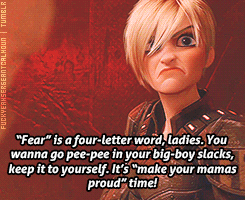

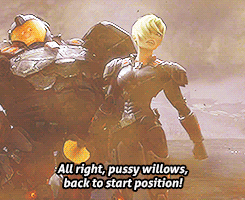
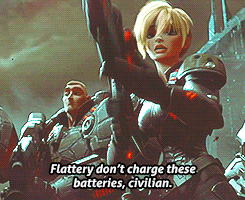


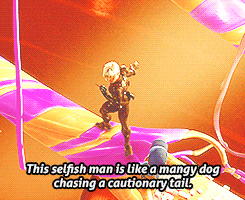

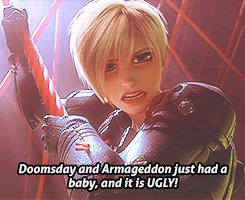

The Best of Sergeant Tamora Jean Calhoun

Bro took it too seriously

legitimately my first feminist awakening as a ten year old child was realizing that girls were expected to respect “boy stuff” but boys were never expected to respect “girl stuff”
Please bear with me, if you have time I’d love to learn and I have a few questions about ISAT worldbuilding:
1. Is there a general time period that ISAT is based in? I’m assuming maybe the 16th or 17th century. Indoor plumbing didn’t become widely available to commoners until the 19th century, so do the villagers just use outhouses in their town? I assume the sinks in ISAT have buckets of water separately you pour into instead of fossetts with running water. Same with tech. I assume because of anxiety meds that medication is pretty modern but something like a pulse oximeter or cars wouldn’t exist in the ISAT world.
2. Does Dormont have a distinct alphabet different from any real world languages? Or not really.
3. This might be a dumb question, but do a lot of people live in the house? Like a college dorm/apartment sort of situation? Are there more houses around dormont or is what we see all there is in terms of housing?
4. Are there any specific swears that people call each other? Not slurs obviously (I wouldn’t ask for anything like that 😨) but things like the word b*st*rd, specifically derogatory words for people you don’t like? Or is that sort of thing unacceptable in the ISAT world and swear words for people don’t exist?
(i start crying and screaming in fear real loud)
-
 pinpointeyess reblogged this · 1 week ago
pinpointeyess reblogged this · 1 week ago -
 mageknightanddemon reblogged this · 1 week ago
mageknightanddemon reblogged this · 1 week ago -
 sorbette reblogged this · 2 weeks ago
sorbette reblogged this · 2 weeks ago -
 ace-king reblogged this · 2 weeks ago
ace-king reblogged this · 2 weeks ago -
 ace-king liked this · 2 weeks ago
ace-king liked this · 2 weeks ago -
 aleksuwu liked this · 2 weeks ago
aleksuwu liked this · 2 weeks ago -
 nancyheart11 liked this · 2 weeks ago
nancyheart11 liked this · 2 weeks ago -
 empresskrennic liked this · 2 weeks ago
empresskrennic liked this · 2 weeks ago -
 brownpanda23 liked this · 2 weeks ago
brownpanda23 liked this · 2 weeks ago -
 brownpanda23 reblogged this · 2 weeks ago
brownpanda23 reblogged this · 2 weeks ago -
 turdofanerd reblogged this · 2 weeks ago
turdofanerd reblogged this · 2 weeks ago -
 therelentlessoptimist reblogged this · 2 weeks ago
therelentlessoptimist reblogged this · 2 weeks ago -
 allthebestscreennamesaregone63 reblogged this · 2 weeks ago
allthebestscreennamesaregone63 reblogged this · 2 weeks ago -
 allthebestscreennamesaregone63 liked this · 2 weeks ago
allthebestscreennamesaregone63 liked this · 2 weeks ago -
 become-mop liked this · 2 weeks ago
become-mop liked this · 2 weeks ago -
 seeking-elsewhither liked this · 2 weeks ago
seeking-elsewhither liked this · 2 weeks ago -
 argen-lobo-ridder reblogged this · 2 weeks ago
argen-lobo-ridder reblogged this · 2 weeks ago -
 99tech99 reblogged this · 2 weeks ago
99tech99 reblogged this · 2 weeks ago -
 99tech99 liked this · 2 weeks ago
99tech99 liked this · 2 weeks ago -
 luke-shywalker liked this · 2 weeks ago
luke-shywalker liked this · 2 weeks ago -
 margindoodles2407 reblogged this · 2 weeks ago
margindoodles2407 reblogged this · 2 weeks ago -
 rockinlibrarians-archive reblogged this · 2 weeks ago
rockinlibrarians-archive reblogged this · 2 weeks ago -
 mikheleworld liked this · 2 weeks ago
mikheleworld liked this · 2 weeks ago -
 nathayolocrayolo reblogged this · 2 weeks ago
nathayolocrayolo reblogged this · 2 weeks ago -
 animeespeon reblogged this · 2 weeks ago
animeespeon reblogged this · 2 weeks ago -
 animeespeon liked this · 2 weeks ago
animeespeon liked this · 2 weeks ago -
 neophwelcome reblogged this · 2 weeks ago
neophwelcome reblogged this · 2 weeks ago -
 astraldestruction14 reblogged this · 2 weeks ago
astraldestruction14 reblogged this · 2 weeks ago -
 traces-to-nowhere reblogged this · 2 weeks ago
traces-to-nowhere reblogged this · 2 weeks ago -
 gazztron reblogged this · 2 weeks ago
gazztron reblogged this · 2 weeks ago -
 maplestar8 liked this · 2 weeks ago
maplestar8 liked this · 2 weeks ago -
 nyl37 liked this · 2 weeks ago
nyl37 liked this · 2 weeks ago -
 corpsebunny1 liked this · 2 weeks ago
corpsebunny1 liked this · 2 weeks ago -
 one-mouldy-lime reblogged this · 2 weeks ago
one-mouldy-lime reblogged this · 2 weeks ago -
 one-mouldy-lime liked this · 2 weeks ago
one-mouldy-lime liked this · 2 weeks ago -
 xanny-7 reblogged this · 2 weeks ago
xanny-7 reblogged this · 2 weeks ago -
 xanny-7 liked this · 2 weeks ago
xanny-7 liked this · 2 weeks ago -
 viktheviking1 reblogged this · 2 weeks ago
viktheviking1 reblogged this · 2 weeks ago -
 hardwarelecampane liked this · 2 weeks ago
hardwarelecampane liked this · 2 weeks ago -
 littlehumansizedbugg reblogged this · 2 weeks ago
littlehumansizedbugg reblogged this · 2 weeks ago -
 willowworbler liked this · 2 weeks ago
willowworbler liked this · 2 weeks ago -
 inkwell1013 liked this · 2 weeks ago
inkwell1013 liked this · 2 weeks ago -
 themarionette-theporcelaindoll reblogged this · 2 weeks ago
themarionette-theporcelaindoll reblogged this · 2 weeks ago -
 justaweebchillin reblogged this · 2 weeks ago
justaweebchillin reblogged this · 2 weeks ago -
 justaweebchillin liked this · 2 weeks ago
justaweebchillin liked this · 2 weeks ago -
 opaquecheshire reblogged this · 2 weeks ago
opaquecheshire reblogged this · 2 weeks ago -
 opaquecheshire liked this · 2 weeks ago
opaquecheshire liked this · 2 weeks ago
